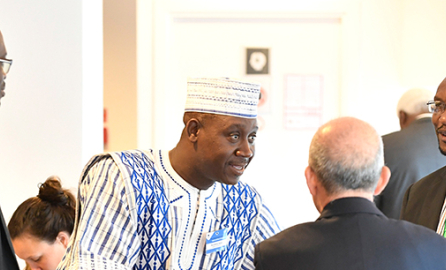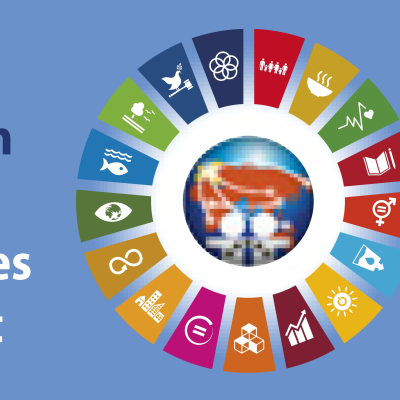What would happen if everyone gave €1 a year for development cooperation? Citizens from Coulaines, a commune in France, are showing what’s possible: they have helped bring water to 15,000 people in their twin-town Kouré, some 5,000km away in Niger.
“We give one euro per person per year, which is about €8,000,” said Christophe Rouillon, Mayor of Coulaines in France’s north-western Pays de la Loire region. “We’ve been doing it for 10 years, bringing water to Kouré, one of the poorest places in the world.”
As well as repairing the existing water supply infrastructure in the thousand-square kilometre commune, the funding helped to construct new wells and to install solar panels to power water supply pumps.
“It’s changed peoples’ lives,” said Hamadou Salifou, Mayor of Kouré. “For example regarding diseases: before, we were troubled by water-borne diseases, but now we have clean drinking water,” said Salifou. “It’s especially changed women’s lives. They used to spend the whole day fetching water; now you just turn on the tap, and there’s water. The impact is huge; for example job creation.”
In the following video the two Mayors explain the project and its impact:
Kouré’s population mainly lives by small commerce and garden farming, and thanks to the improved water reliability, villagers can cultivate millet, cowpea, corn, sesame, peanut and sorrel, improving the area’s food security.
The citizens of Coulaines co-finance the project with the General Council of Sarthe, the Ministry of Foreign and European Affairs, SIDERM (French syndicate for drinking water supply) and the rural Commune of Kouré.
Part of the project involved setting up a local water organisation to monitor the project and ensure a fair price for the water. “Citizens are willing to give their money, but they would like the money to go to the project and not the pocket of a local representative,” said Rouillon. “If they know where their money goes, they will support our action.”
The project also makes sense for Coulaines, according to Rouillon. “The people of Coulaines think it’s a good idea. They see that it’s the best way to control the consequences of illegal immigration, the fight against terrorism, and contribute to protecting the environment in the region.”
According to Rouillon, it’s increasingly difficult to get financial support from local authorities. “Our region, Pays de la Loire, have cut their budget, and they think the first economy is to cancel support for decentralised cooperation.”
“The second difficulty is that the EU supports the big projects, but doesn’t want to be involved in the small projects, even if they have a big impact,” said Rouillon. “I think the EU should have a budget for this local action; with good connections between the towns of the North and the South, with good visibility of the results.”
“Just think, if all the local authorities in Europe had the same attitude, we would have €500 million,” said Rouillon. “And it multiplies: when local authorities give money, perhaps we would have €3, €4 or €5 from the state and from NGOs.”
Trends in Decentralised Cooperation
The EU is giving more prominence to decentralised cooperation, aid extended by local and regional governments to reinforce capacities and service delivery in partner authorities. The European Commission identified Local Authorities as key actors for achieving democratization, human rights, good governance, and inclusive and sustainable growth in its Agenda for Change.
|
Key steps
2008: The European Commission’s Communication on "Local Authorities: Actors for Development" is the first EU reference document to highlight the role and importance of local and regional authorities in EU development policy. The biennial Assises of Decentralised Cooperation are launched as a result.
2013: The European Commission’s Communication on "Empowering Local Authorities in partner countries for enhanced governance and more effective development outcomes" recognises local authorities as genuine actors of development cooperation and, in accordance with the principle of subsidiarity, as key partners to reach good governance and sustainable development.
2015: The 2030 Agenda and Sustainable Development Goals are adopted; 65% of the 169 targets can only be reached by working closely together with local and regional authorities.
2015: The European Commission signs Framework Partnership Agreements with five associations of local authorities, promoting their interests in national policy dialogues, greater decentralisation, and knowledge-sharing to improve their capacities. One outcome is the CONNECT tool developed by CEMR, which encourages the transfer of experience, knowledge and skills between municipalities and regions around the world.
2017: The New Consensus on Development - part of Europe’s response to the 2030 Agenda - underlines that the EU and Member States will use decentralised cooperation as a tool to strengthen their cooperation with local and other sub-national authorities.
2017: The European Commission and the High Representative for Foreign Affairs and Security Policy’s Joint Communication on a strategic approach to resilience emphasises the role of local authorities when building inclusive and participatory societies, and that LAs’ capacities for risk management and for early responses should be strengthened.
2014-20: The "Civil Society Organisations and Local Authorities" (CSO-LA) thematic programme under the Development Cooperation Instrument is allocated €1.9 billion. In addition, the European Commission commits about €1 billion to local development through its ongoing bilateral programmes.
|
“EU institutions have been instrumental in recognizing local governments as public authorities,” said Jean-Pierre Elong Mbassi, Secretary-General of the umbrella organisation United Cities and Local Governments – Africa (UCLG-Africa).
“For a long time, local governments were seen as non-state actors, and thanks to the EU communication of 2013, they are now recognized as public authorities,” said Elong Mbassi, speaking at the fifth Assises on Decentralised Cooperation in Brussels. “That is headway because it allowed them to have a coordinating role in mobilising the leading forces in each territory, to get involved into the improvement of the living condition of the people.”
“We see in decentralised corporation a way of having development down to the grassroots, and inspiring the way we define and implement policies, and the way we measure their impact. It is also a way of improving relations between people across the world, and we see it as a route to changing the logic of development,” said Mbassi. “For me, decentralised corporation is the human face of international relations.”
In the following video, Jean-Pierre Elong Mbassi discusses how decentralised cooperation could be more effective, and the role EU institutions can play:
Decentralised development cooperation only accounts for a small part of international development spending, but it is playing a growing role.
A team at the OECD has been tracking decentralised cooperation spending, measured as countries’ self-reported ODA flows through local and regional governments. The total annual volume has gone up from $1.7 billion in 2005 to $1.9 in 2015 – about 6% of total bilateral ODA flows from those donors. It might not sound like a leap, “but it’s quite a surprise because this has happened alongside the financial crisis and rising populism,” said Aziza Akhmouch, Head of SDGs, Water, Local Public Services and Regional Development Policy at the OECD. “It really confirms the importance, the increasing advocacy and intervention of local and regional governments in the field of development cooperation.”
Decentralised cooperation has two particular strengths compared with the traditional forms of cooperation undertaken at national level, according to the OECD study, which will be released in full next year. One is the importance of non-financial support provided to partner countries: “We could see that decentralised development cooperation increasingly provides peer-to-peer learning and knowledge exchange opportunities between local and regional governments,” said Stefano Marta, of the OECD. “It’s very tangible, for example communities can share experiences of how they have dealt with various issues at community level, and bring that to other communities they work with and support them in that regard.”
Decentralised cooperation’s other strength is in its approach to climate change. “There was a very high focus on climate adaptation activities,” said Cecilia Piemonte, an economist at the OECD. “And that speaks again to the fact that it’s communities sharing knowledge on how to actually adapt to the climate change that is already happening, which is a big priority internationally.”
In the following video, Aziza Akhmouch and Jens Sedemund outline the takeaways of the report:
As well as increasing in volume, decentralised cooperation is also changing form, according to Agustí Fernández de Losada, coordinator of Platforma’s recent study on decentralised cooperation.
“Traditional modalities focused on the rich North providing assistance to the poor South, but this has been declining for many years,” said Fernández de Losada. “This doesn’t mean that North-South relationships are not still important; there are still innovative relationships which provide a very interesting impact in terms of sustainable development.” But Fernández de Losada pointed to South-South, and triangular cooperation as growing areas of activity, underlining that even North-North relations benefit from decentralised cooperation.
As shown in Platforma’s recent study, in South-South cooperation models, the idea of cooperation between equals becomes even more meaningful than in traditional North-South schemes. This is because experiences and knowledge generated in the South – which are as valid and innovative as those generated in the North – are generally easier to transfer to other Southern realities, which are closer from an economic, social, cultural and political point of view.
When South-South cooperation schemes count on the support of other local and regional governments from the Global North (triangular cooperation), the exchange of experiences; transfer of knowledge and technology; mutual learning; or the development of innovative pilot actions, can be reinforced as new ideas and perspectives come into play.
Finally, the Northern territories still have a lot to learn and exchange, which is what the European Territorial Cooperation policy – and other similar models – has been implementing for some time now. The added value of these models lies in the fact that they take into account all dimensions and stakeholders of the territory, thus approaching territories from an integral, multi-dimensional and multi-stakeholder perspective.
In the following video, Agustí Fernández de Losada defines decentralised cooperation and how it’s changing [0:05]; outlines the key criteria for effectiveness [1:13]; and discusses its main added value [2:22]:
“I don’t think the value of decentralised cooperation is the transfer of funds,” said Fernández de Losada. Rather, “it provides a platform for the transfer of know-how and knowledge that local or regional governments have. It is a powerful tool to reinforce local and regional capacities, to implement their policies and to provide services.”
For Fernández de Losada, the key ingredients for effectiveness in decentralised cooperation are inclusivity, local ownership, focus on results and accountability – all of which align with the principals set out in the Busan partnership for effective development cooperation.
“Busan was not set up with decentralised cooperation in mind,” said Fernández de Losada. “But it’s a good match in many ways. When we speak about ownership, local and regional government have proximity as public institutions, and they have a capacity to work with the stakeholders at territorial level, to engage them in development cooperation initiatives, and make those initiatives more accountable to our citizens.
“There is a general consensus that local and regional governments play a crucial role in sustainable development” – proof of this is that they were very active during the preparation of the Sustainable Development Goals (SDGs), and they continue to be so in the localising process. Decentralised cooperation is consequently a key resource for achieving the SDGs with localised approaches, as well as the New Urban Agenda, and other global agendas.
Further reading
https://lra4dev.cor.europa.eu/portal/fr/coopmonth/Pages/Coulaines.aspx
https://www.devex.com/news/q-a-what-is-decentralized-development-cooperation-90664
Image credits: European Union / Fred Guerdin; 5th Assises of Decentralised Cooperation via Creative Commons license 2.0


Log in with your EU Login account to post or comment on the platform.